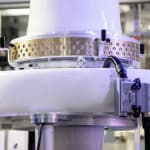
Reifenhäuser Blown Film presents a new high-performance cooling system on the market for its "EVO FFS" blown film line. It was specially developed for heavy-duty bag applications and achieves record output rates of more than 600 kg/h. Thanks to high-precision flow-optimized components, the new Ultra Cool 2.0 FFS delivers higher throughput while maintaining optimum film properties.
The production of form-fill-seal (FFS) bags for heavy goods is a fiercely competitive market where output rate determines commercial success. At 600 kg/h, Reifenhäuser exceeds customary top values by about 50 to 100 kg, so setting a new benchmark. EVO Ultra Cool 2.0 FFS is suitable for all common formulations and applications (consumer goods, industry, agriculture, etc.), offering at the same time operator friendliness and high line availability. When it comes to mechanical film properties and thickness tolerances, they have achieved the best results in all product tests. This greatly simplifies processes to convert the film on printing and filling machines. Long service life, easier machine startup and reliable quality also make for high competitiveness and operating comfort. In order to participate in the growing market for sustainable products, the line safely processes recyclate and recyclable raw materials.
Eugen Friedel, Sales Director at Reifenhäuser Blown Film, explains: "With our record output exceeding 600 kg/h, we provide our customers with an attractive return on investment and the potential prospect of long-term success on the market. EVO Ultra Cool 2.0 FFS achieves unrivaled performance values without compromising on quality or process reliability."
For its EVO FFS lines, Reifenhäuser offers not only the premium version "EVO ULTRA COOL 2.0 FFS" but also the standard version "EVO COOL FFS". This allows customers to find the perfect solution for every requirement - but in every situation, its performance is above average. All EVO FFS lines are equipped with proven Reifenhäuser EVO extruders and die heads for optimized melt quality at very low melt temperatures.




